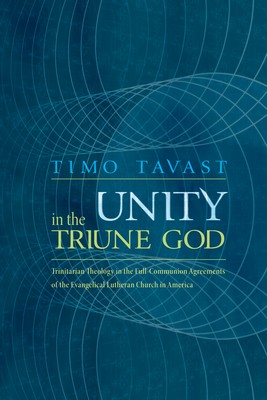
- We will send in 10–14 business days.
- Author: Timo Tavast
- Publisher: Wipf & Stock Publishers
- Year: 2012
- Pages: 202
- ISBN-10: 1498262740
- ISBN-13: 9781498262743
- Format: 15.2 x 22.9 x 1.3 cm, hardcover
- Language: English
- SAVE -10% with code: EXTRA
Reviews
Description
Description: The contemporary trinitarian paradigm in systematic theology has been internationally well-known since the time of Karl Barth and Karl Rahner and, particularly, since the contribution of their famous successors. Many of them, Wolfhart Pannenberg and Robert W. Jenson among others, have intentionally shown in their writings what the general ecumenical relevance of the findings of trinitarianism might be. However, the academic research of ecumenism has not yet fully investigated how ecumenically-oriented trinitarian theology has been factually applied in varying ecumenical relationships and agreements. Unity in the Triune God focuses on the ecumenism of the Evangelical Lutheran Church in America with its full-communion partners--the Presbyterian Church (USA), the Reformed Church in America, and the United Church of Christ (1997); the Episcopal Church (1999); the Moravian Church in America (1999); and the United Methodist Church (2009). Together all these ecumenically active denominations have shown in their full-communion agreements that the doctrine of the Trinity and the church's common trinitarian confession are not meaningless relics from ancient times, but rather are dynamic and many-sided ecumenical resources that can be used for several functions in full-communion agreements. The goal of this study is to reveal the differing ways in which to utilize this ecumenical potential of the trinitarian faith. Endorsements: ""Tavast opens fresh possibilities for reimagining the implications of a robust trinitarian ecclesiology for the life of the church. The book is accessible to those new to the ecumenical movement, yet will be appreciated by those who have long been involved in a quest for greater church unity."" --Robin J. Steinke, Lutheran Theological Seminary at Gettysburg ""Tavast provides the kind of detailed analysis that ecumenical theology needs today: careful, scholarly, and sympathetic. That the Trinity provides the foundation for the unity of the church is too often an unexamined cliché."" --Michael Root, The Catholic University of America ""This is a unique and creative application of key Trinitarian theological claims . . . demonstrating the importance of rich, nuanced, and theological thinking for the life of the church in the twenty-first century. It sheds new light both on trinitarian doctrine and on the role it plays in ecumenical dialogue."" --Kristin Johnston Largen, Lutheran Theological Seminary at Gettysburg About the Contributor(s): Timo Tavast is Post-doctoral Scholar in Ecumenics and ordained member of the Evangelical Lutheran Church of Finland.
EXTRA 10 % discount with code: EXTRA
The promotion ends in 13d.05:18:35
The discount code is valid when purchasing from 10 €. Discounts do not stack.
- Author: Timo Tavast
- Publisher: Wipf & Stock Publishers
- Year: 2012
- Pages: 202
- ISBN-10: 1498262740
- ISBN-13: 9781498262743
- Format: 15.2 x 22.9 x 1.3 cm, hardcover
- Language: English English
Description: The contemporary trinitarian paradigm in systematic theology has been internationally well-known since the time of Karl Barth and Karl Rahner and, particularly, since the contribution of their famous successors. Many of them, Wolfhart Pannenberg and Robert W. Jenson among others, have intentionally shown in their writings what the general ecumenical relevance of the findings of trinitarianism might be. However, the academic research of ecumenism has not yet fully investigated how ecumenically-oriented trinitarian theology has been factually applied in varying ecumenical relationships and agreements. Unity in the Triune God focuses on the ecumenism of the Evangelical Lutheran Church in America with its full-communion partners--the Presbyterian Church (USA), the Reformed Church in America, and the United Church of Christ (1997); the Episcopal Church (1999); the Moravian Church in America (1999); and the United Methodist Church (2009). Together all these ecumenically active denominations have shown in their full-communion agreements that the doctrine of the Trinity and the church's common trinitarian confession are not meaningless relics from ancient times, but rather are dynamic and many-sided ecumenical resources that can be used for several functions in full-communion agreements. The goal of this study is to reveal the differing ways in which to utilize this ecumenical potential of the trinitarian faith. Endorsements: ""Tavast opens fresh possibilities for reimagining the implications of a robust trinitarian ecclesiology for the life of the church. The book is accessible to those new to the ecumenical movement, yet will be appreciated by those who have long been involved in a quest for greater church unity."" --Robin J. Steinke, Lutheran Theological Seminary at Gettysburg ""Tavast provides the kind of detailed analysis that ecumenical theology needs today: careful, scholarly, and sympathetic. That the Trinity provides the foundation for the unity of the church is too often an unexamined cliché."" --Michael Root, The Catholic University of America ""This is a unique and creative application of key Trinitarian theological claims . . . demonstrating the importance of rich, nuanced, and theological thinking for the life of the church in the twenty-first century. It sheds new light both on trinitarian doctrine and on the role it plays in ecumenical dialogue."" --Kristin Johnston Largen, Lutheran Theological Seminary at Gettysburg About the Contributor(s): Timo Tavast is Post-doctoral Scholar in Ecumenics and ordained member of the Evangelical Lutheran Church of Finland.


Reviews